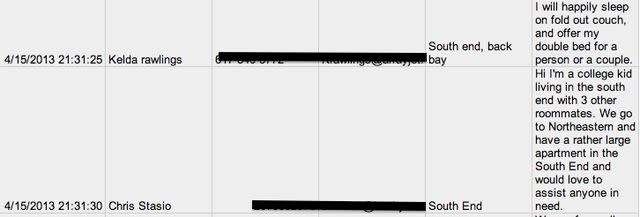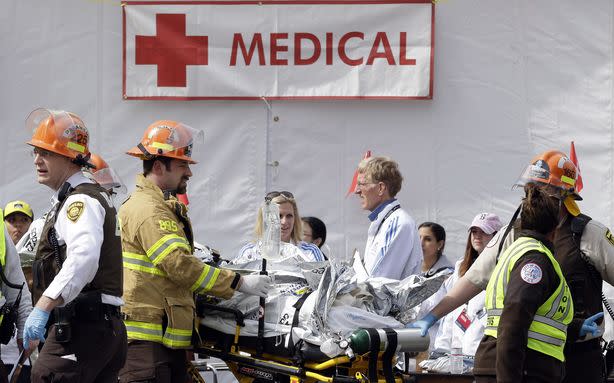This Is What Boston Heroism Looks Like
We don't know all their names. We don't know where they all came from. But the good people seemed to come from everywhere on a day when there was not too much good news in Boston. They are average citizens. They are marathon runners and football players. They are doctors and nurses and trained professionals. They are, in some small and often anonymous way, a part of all of us right now. And yet a whole lot more. As Mr. Rogers once said, "When I was a boy and I would see scary things in the news, my mother would say to me, 'Look for the helpers. You will always find people who are helping.'" These are some of the helpers we've met so far from Patriot Day.
RELATED: Saying Something About Boston
The People of Boston
RELATED: A Reminder to Be Good to Each Other
In the the jagged and turbulent videos showing the all too horrifying power and chaos of the explosions, we saw that all too familiar sign of heroism: people running toward the smoke, into the danger. But those shaky, two-minute YouTube clips only scratched the surface of what the city of Boston is capable of — which is to say a lot. We didn't see the marathoners who continued running to the hospital to give blood, the runners sharing their foil blankets. There were heroes in the margins in Copley Square this April 15th, almost from the instant. And within hours of the blasts, there were so many good people who wanted to donate blood that the Red Cross of Eastern Massachusetts — and, later, Mass General and other hospitals — had to turn good people away:
Due to the generosity of our donors we don't need blood at this time. Please schedule for a future donation redcrossblood.org #marathon
— RedCrossEasternMA (@RedCrossEastMA) April 15, 2013
Thanks to generosity of volunteer blood donors there is currently enough blood on the shelves to meet demand. #BostonMarathon
— American Red Cross (@RedCross) April 15, 2013
And then there's this 524-page Google document full of Bostonians offering marathon runners a place to stay. Some of them offered rides to pick people up, others offered their own beds:
RELATED: Why Was the New York Post the Outlier in Boston Marathon Coverage?
RELATED: Run On: Bombs Can't Stop the Spirit of America's Marathoners
Restaurants like Pelon Taquería and Oleana offered warm meals to those who needed them. And just take a quick glance through the voluminous hashtag #Bostonhelp on Twitter if you want to see all of the local businesses and citizens willing to help, recharge, and shelter those in need. (Seriously, go look — it will make you feel better about human beings.)
RELATED: After a Bombing in Boston, All Quiet In Washington
As our former Atlantic Wire colleague Jared Keller wrote for Medium.com, well:
But let me tell you this, more specifically: you don’t fuck with Boston. We can be surly, rude, and perpetually obnoxious; we’re not the biggest city, or the best city, but we’re where America started. We fought the British before there was even an America; our last disaster was a giant molasses flood. It takes more than a coward, armed with explosives, killing from afar, to keep us from being good to each other. ...
We’re not going anywhere. We love that dirty water. You don’t fuck with Boston, because Boston fucks back
The Volunteers, the Runners, the Spectators
It's hard to imagine what was going through the heads of the thousands of volunteers hired by the Boston Marathon. Transforming from a purveyor of Gatorade cups into a first responder is not an easy thing to fathom. What's not hard to imagine is what they did in the face of that: These good people helped. Here's one story, from a verified Boston Marathon volunteer, which was shared on Reddit:
And some marathoners tore off their shirts to use as tourniquets:
For every act of terror there's a hero. This guy ran marathon & ran to danger ripping off his shirt for a tourniquet twitter.com/12ReasonsWhy/s…
— Zoë (@12ReasonsWhy) April 15, 2013
Perhaps unfairly — and unwillingly — some people watching the marathon on their day off for Patriot Day ended up garnering more attention than others. Perhaps no bigger hero emerged by celebrity accident than the hulking former New England Patriots offensive lineman Joe Andruzzi, who was supporting runners running for his cancer foundation. Andruzzi jumped into the fray and began helping runners:
Ex-Patriots OL RT @gregabedard Yup, that's @andruzzi63 “@kavekrew: is this Joe Andruzzi? CNN site twitter.com/kavekrew/statu…”
— Ian Rapoport (@RapSheet) April 16, 2013
Another good person is one we told you about earlier today: Carlos Arredondo, a Cuban-American immigrant who was at Copley Square to support the runners honoring his son Alexander, a soldier who died in the Iraq war. He was part of what's become one of the most iconic photographs of the bombings, though he did much more than what this Associated Press photograph (Warning — graphic, but cropped) shows:
The Portland Press Herald reported:
The two friends crossed the street and Mixon started ripping away the snow fence and scaffolding to get at the victims. Arredondo vaulted it and tried using his clothes and towels to stanch the victims' bleeding but they were hurt too badly.
Keep in mind that Andruzzi and Arredondo are involuntary symbols of heroism. And as the Patriots' Andruzzi points out in a statement he released, he doesn't need or want that attention:
While I appreciate the interest in hearing our perspective on today's horrific events, the spotlight should remain firmly on the countless individuals -- first responders, medics, EMTs, runners who crossed the finish line and kept on running straight to give blood, and the countless civilians who did whatever they could to save lives. They were the true heroes. Our thoughts prayers go out to all those affected by this senseless tragedy.
The First Responders
The stories from Boston's first responders — its doctors, nurses, policemen, firefighters, EMTs, volunteers, and more — are slowly trickling into the local papers, onto television, everywhere. These people, as doctors at briefings last night and today made clear, are still working overtime, on almost no sleep, and especially after a marathon. But tales of their bravery are worth sharing. For example, one team of nursing students who were prepared to treat running injuries during the marathon immediately transformed into first responders, as CBS News reports:
And then there's the story of Dr. Allan Panter, who was watching his wife Theresa run the marathon. Allan was waiting at the finish line. He went straight to work, telling ABC News that he tried to help a seriously injured woman: "I started trying to control the airway, another gentleman started doing CPR and we worked until we got a stretcher there," he said. "We had a pulse until we got her to the medical tent and then we lost her." Theresa eventually found her husband covered in blood, she recalled to ABC: "He basically has told everybody, 'I was just doing my job, you know, I'm not a hero.'"
And CNN spoke with Jim Assiante, a first responder who spent time in Iraq before helping in Boston on Monday:
Of course, thousands of good people deserve our gratitude today, and in the days to come. We couldn't possibly know them here, or know them all, or know them ever. Perhaps President Obama said it best in his first remarks Monday:
Boston police, firefighters, and first responders as well as the National Guard responded heroically, and continue to do so as we speak. It's a reminder that so many Americans serve and sacrifice on our behalf every single day, without regard to their own safety, in dangerous and difficult circumstances. And we salute all those who assisted in responding so quickly and professionally to this tragedy.
(Click here for more stories of kindness after the bombing, and here for complete coverage.)





